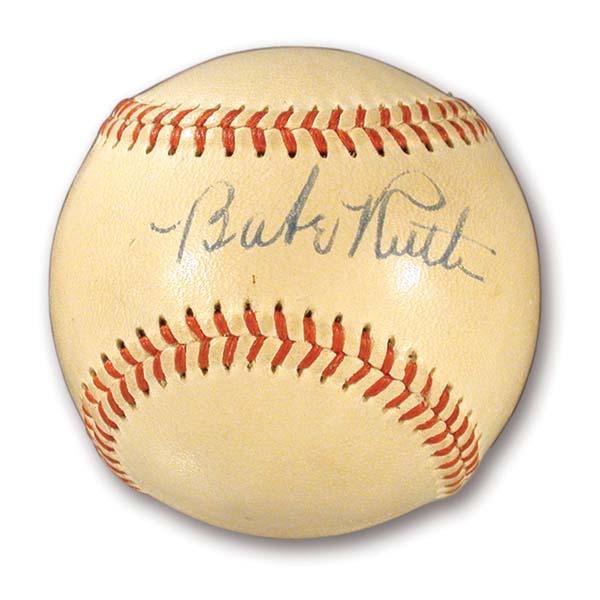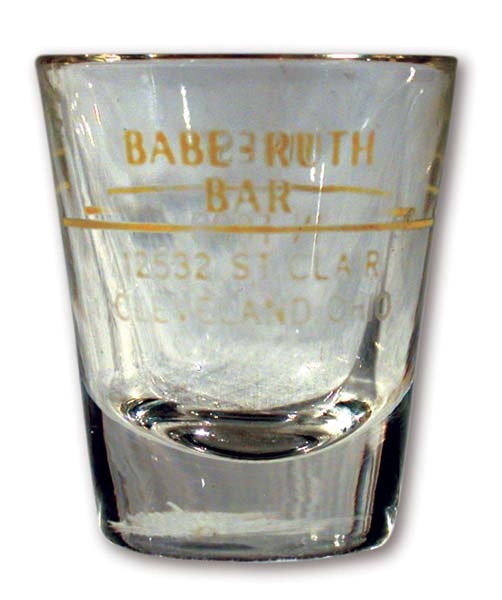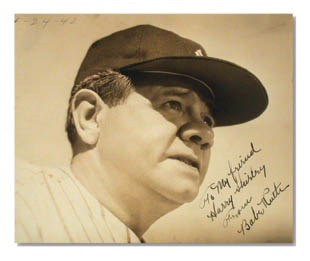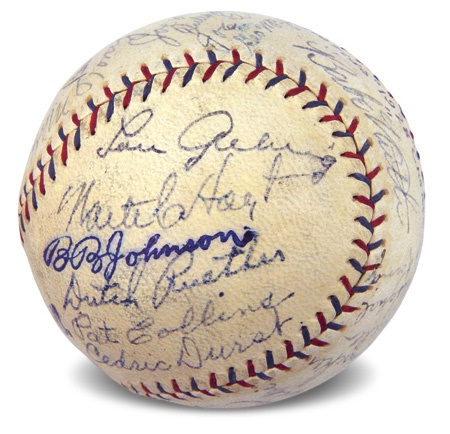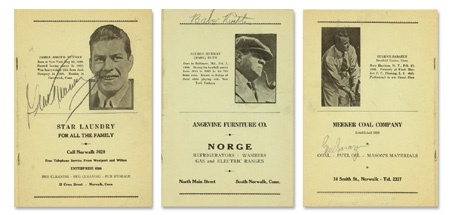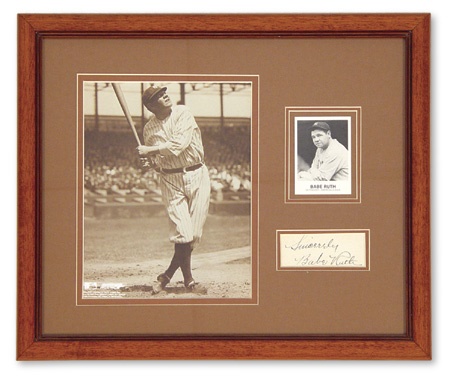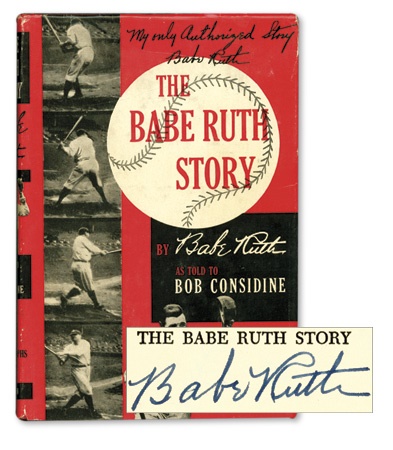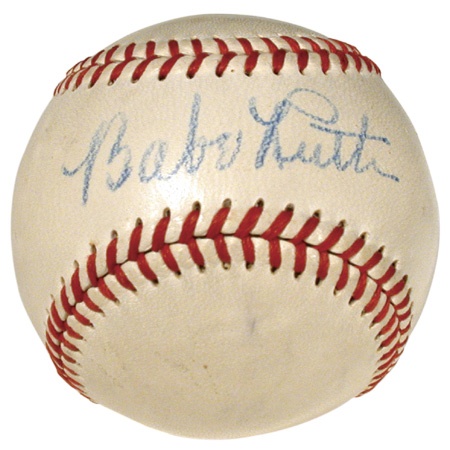Consign Your Best Items with Lelands. We Also Pay Cash on the Spot! Learn More Here.
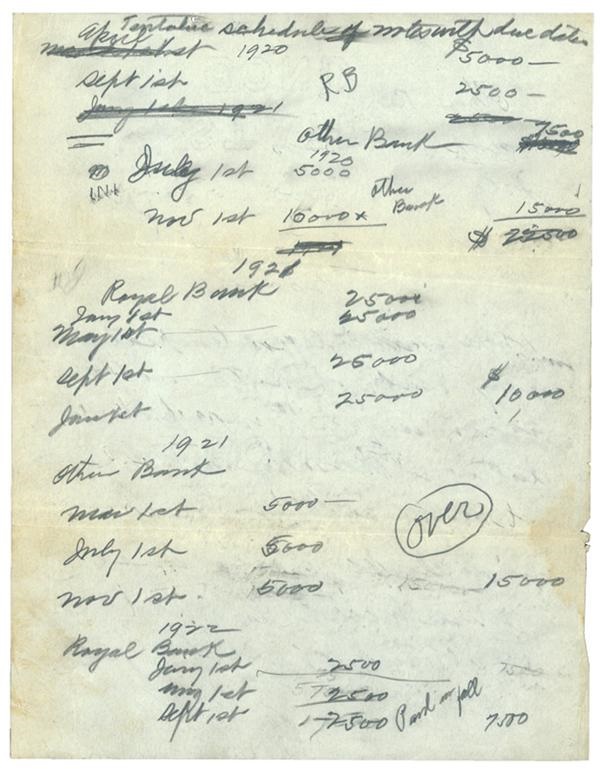
Babe Ruth Contract Notes For His Sale To The Yankees
Any bit, piece or particle of unburied original residue from the most famous -- infamous in the town known for its baked beans -- transaction in sports history is a collector's cause celebre, and here is one of the best artifacts ever from the trade that sent Babe Ruth to the Yankees and cursed the Red Sox for 86 interminable seasons. On both sides of this plain sheet of 8 1/2 x 11" paper are notes apparently made by none other than Harry Frazee, the Red Sox owner exiled to eternal Perdition by Bostoners, in which Frazee jiggers some financial facts and figures around to help make the mother of all bad business deals doable. To set the scene, it was the winter of 1919 and Frazee, a Broadway producer who owned the Sox as a sidelight, was reeling from the economic losses he'd incurred from a season that saw the Sox go from world champs to 6th-place also-rans. Looking for a scapegoat, Frazee decided that Ruth -- who had merely hit a team-high .322 with an AL-best 29 homers and 114 RBIs (and also went 9-5 as a pitcher) -- was the root of all evil, publicly ragging the young Bambino as a slacker and a bad influence on the team. Not coincidentally, Frazee was in the process of trying to bankroll his newest stage production, the musical "No No Nanette." This precipitated the most fateful dinner invitation in history, to the only other owner well-heeled enough to indulge Frazee's half-baked scheme -- to trade Ruth for a high enough pile of dough. At that dinner, in December at a Manhattan steak house, Col. Jacob Ruppert, may have nearly choked on his tenderloin when Frazee proposed the deal. Ruppert certainly wasted no time in agreeing, and a contract readied. But before it could be signed, Frazee had to know where every dollar entering his pocket would come. The overall deal was for a nice, round $100,000, but it would be divided into a $25,000 immediate payment from Ruppert, plus annual $25,000 payments for the next 3 years. Crunching the numbers, Frazee meticulously went over proposed disbursements from the Yankees for each pay period, which would come from 2 banks and add up to the 25-grand figure, one being the Royal Bank and one he simply noted as "Other Bank." Frazee evidently concluded the disbursements should not be annual but sliced into sub-payments throughout the year, some due on Jan. 1, May 1 and Sept. 1, others in March, July and November. For an accounting novice, the figures seem disjointed and hard to follow, but remember Frazee was a Broadway money-raiser and so everything worked inside his head. Explaining his methods, Frazee wrote on the 2d page, "This schedule contemplates payment of Ruth notes according to their respective dates. The only material change is that we spread partial payments over entire period instead of at end of each year." However, it seems Rupper, who had the leverage, may have overruled this scheme, because when the contract was signed on December 26th (though the deal would not be officially announced until January), the terms were left as annual payments of $25,000 (plus 6 percent interest), as evidenced by the photostat of the 5-page contract included here, which was drawn up by the Fitch & Grant law firm at 32 Nassau Street in New York City. The contract also has a provision that makes Frazee have to kick in 50% of any raise given to Ruth thereafter above $15,000 and any bonus above $10,000. In a separate contract, Rupper also guaranteed a $30,000 loan, using Fenway Park as collateral. Clearly, Frazee was so desperate for a deal, he may have sold his first-born to get the deal done, if need be. But don't think of him as a bumbling fool. Frazee bought the Sox for $400,000 in 1917 and sold them for $1.5 million in 1923. The historically profound document is written in pencil, with every number and word bold and readable. Page is G-VG with some soiling here and there, mild damage on left and right edges, and 2 horizontal fold marks. Tremendous inside look at the deal that altered baseball forever.
Past Sports Card, Memorabilia, Non-Sports Card and Collecitble Auction Items
Other past auction items that may be of interest to you.

